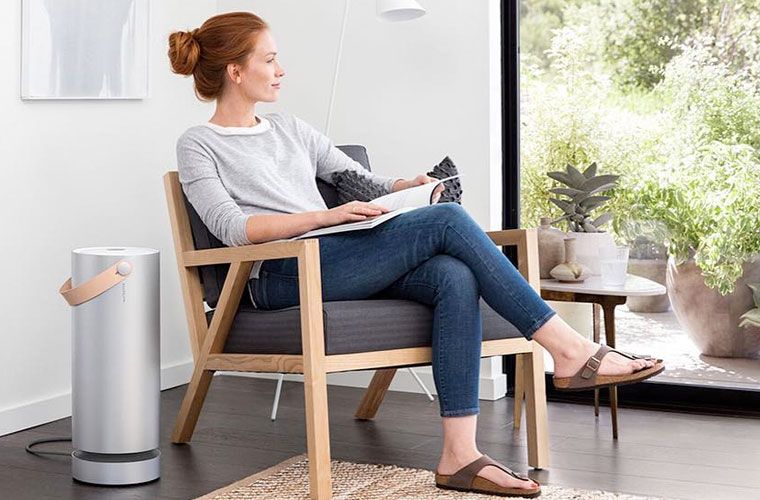 Is it Fair to Keep Green Plants that Might Not Clean the Air? Is it Fair to Keep Green Plants that Might Not Clean the Air? Air is omnipresent without which life cannot exist. Water is yet another natural resource that’s much needed for survival. Both air and water, nature’s gift to mankind is available throughout the world, or at least were available, but now we can see fleets of water lorries jetting their way in and out of our narrow roads supplying the much-needed water for daily survival. Some days pass by without the presence of a drop of water in our pipes solely relying on the stored cans and tubs. On the other hand, I saw an advertisement in a shopping mall attracting people’s attention by displaying a colorful banner for pure air-You get to breathe clean and pure air for sixty minutes at the expense of Rs. 500. Pathetic! Air, that’s not sealed in containers and sold, is now publicized for its purity. We are responsible for such depletion in our resources and once again we are trying to mint money using the same situation. New Delhi stands tall among other cities as India’s capital in pride and charm but the same city also suffers from debilitating air quality year after year with inadmissible air pollution rates existing everywhere. The situation is not any better in other metropolitan cities and villages too are not far behind in this. Individuals want to take a deep breath but are also too scared to take one. Cities are overpopulated and people live in flats that are like air-tight containers that make way for fumes such as volatile organic compounds (VOCs) and biological irritants (dust mites) to accumulate in due course. This makes indoor air quality even worse (almost 5 times worse) than outdoor air quality. There has been innumerous articles and insights highlighting the debilitating effects of air pollution-heart diseases, stroke, asthma, kidney problems, eye/lung infection and cancer are few of them. This makes air purifiers and air purifying plants one of the biggest wellness trends in recent years. How well do these claims live up to their hype? Indoor Air Purifiers According to MarketWatch, an American financial information website, demands for air purifiers are increasing worldwide at nearly 10% a year with its value expected to reach around $33 billion by 2023 (https://www.smh.com.au/lifestyle/health-and-wellness/air-purifiers-are-the-big-trend-for-2020-but-are-they-worth-it-20200108-p53pt8.html). State governments in cities like Delhi have installed outdoor air purifiers at major intersecting roads but some feel that its like trying to cool a room with air conditioner when its wide open without a roof. Also, doctors doubt the benefits of such purifiers greatly-a poll by Curofy conducted in Delhi on more than 1,500 doctors showed that more than 65% of them responded that air purifiers cannot save quality of outdoor air. The purifiers might offer protection and effectiveness against particulate and smoke in a limited area. But priced anywhere from a few thousands to lakhs are we smart to invest so much money in this equipment? There are several factors to consider before answering this question. An air purifier that uses a multistage filtration system to remove pollutants and smoke is effective depending on the size of the purifier in comparison to the size of your room, presence/absence of pets and the location of your apartment. Don’t expect the purifier to work when you have smoke inside the room in the form of an incense stick or cigarette during which the doors and windows need to be kept open. Shutting your house for longer period of time increases the risk of carbon dioxide, a gas that cannot be removed by the purifiers. Keeping doors and windows open also does brings down the effectiveness of air purifiers. Some people believe that air conditioners serve a dual role acting as a purifier too which is absolutely wrong. These devices play no role in removing air pollutants as they are ineffective for small particles and we do need an air purifier to do the purification role. Different purifiers fulfil different purposes and the presence of some features are more helpful for those with asthma and allergies. This includes a high-efficiency particulate air (HEPA) 13-grade or higher filter (that can even remove PM 2.5-sized particles) and an activated carbon filter that has the ability to remove smoke and gasses from air. The HEPA filters need to be periodically cleaned and replaced to sustain the effectiveness of the air purifier. There is even a small study from China that claims that indoor air purifiers might aid people with heart conditions (https://in.reuters.com/article/us-air-pollution-heart/indoor-air-purifiers-may-aid-heart-patients-idINKBN0OD2UJ20150528). We already know that air particles increase the risk of heart-related problems and the study showed that using air purifiers helped participants improve measures of inflammation and blood clotting while decreasing blood pressure and reducing airway inflammation. The effectiveness of the purifier depends on a lot of things-its quality, size of the room, size of the purifier and so on. Indoor Plants Many of our homes are ornamented with tiny little potted plants that sit in one corner of the room. Home décor shops boast of a complete list of plants that promise to remove toxins, chemicals and other pollutants from the air and online sites too provide great offers and combo deals on such plants. Though the craze for green plants to keep our homes green has become evident only in the last decade or so, businesses and homes started investing in greenery to clean air ever since NASA published a paper in 1989 claiming that houseplants can suck air pollution and toxic chemicals. The study showed that plants can lead to decay of volatile organic compounds (VOCs) in a sealed chamber but meta-analysis proved that ventilation in indoor environments can dilute VOCs a lot faster than what plants can remove from the air. And, it could take more than 1,000 plants per square meter to gain benefit that’s much better than simply opening some windows. The study by NASA failed badly because of the test conditions-NASA conducted its tests in a sealed container that does not mimic the conditions existing in most people’s households. NASA found that garden plants such as bamboo, English ivy, gerbera and peace lilies have he potential to remove formaldehyde, benzene and trichloroethylene but this misconception has been cleared now-plants are great but they don’t clean indoor air to have any improvement in air quality. Then why there is so much hype created by the business sector-its nothing but an indication that the houseplant industry is cherry-picking data (https://www.theatlantic.com/science/archive/2019/03/indoor-plants-clean-air-best-none-them/584509/). First, for plants to improve air quality you need 10 of them every square foot of office/home space and the variety of these plants that can actually purify air is only achievable by the most dedicated plant lovers. But don’t be discouraged and throw off your potted plant into the bin. There is evident research showing that these plants can elevate mood, calm individuals, lower blood pressure, improve attention capacity and bring happiness irrespective of whether or not it helps you breathe clean air. Masks Air purifier masks are yet another option that’s inexpensive comparably and also likelier to be effective against particulate matter-they do reduce PM 2.5 inhalation but we do not know by how much. A standard mask doesn’t provide any protection against pollution and how you fit the mask also plays a great role in its effectiveness in reducing pollutant risk. Studies on the effectiveness of air purifier masks could not prove until now that these masks offer protection from long-term effects of air pollution such as heart disease. Such masks can only prevent some particulate matter but not harmful carcinogenic gases like benzene that can only be prevented using specialized masks that’s medically cleared for industrial use (https://theprint.in/india/governance/no-study-has-yet-proven-health-benefits-of-pollution-masks-air-purifiers/159826/). Choose the best protection method that works best for you. Above all, take every precautionary step to reduce air pollution rates as much as possible and save yourself and the world from further hazards. References Air Purifiers: 7 Myths You Should Stop Believing: https://economictimes.indiatimes.com/news/politics-and-nation/air-purifiers-7-myths-you-should-stop-believing/no-point-buying-expensive-air-purifiers/slideshow/71935044.cms Outdoor Air Purifiers & Indoor Play: https://www.theguardian.com/world/2018/sep/29/outdoor-air-purifiers-and-inside-play-delhi-gears-up-for-annual-pollution-fight Doctors Question Efficacy of Air Purifiers: https://www.thehindu.com/news/cities/Delhi/Doctors-question-efficacy-of-air-purifiers/article16440354.ece Which Houseplants You Should Buy to Purify Air? None of Them: https://www.nationalgeographic.com/science/2019/11/houseplants-dont-purify-indoor-air/ Pot Plants Barely Clean the Air, So Best to Just Open a Window, Say Scientists: https://www.telegraph.co.uk/science/2019/11/06/pot-plants-barely-clean-air-best-just-open-window-say-scientists/ New Research Busts Myth That Indoor Plants Improve Air Quality: https://www.forbes.com/sites/linhanhcat/2019/11/13/indoor-plants/#7f7142b74b46 Comments are closed.
|
AVOID FRAUD. EAT SMART.+91 7846 800 800
AuthorDietitian & Nutritionist Dr. Nafeesa Imteyaz. Archives
November 2022
Categories
All
Dr. Nafeesa's Blog @blogspot |
- Home
- Written Testimonials
- Consult
- Clinics
- Blogs
-
Diet & Nutrition
- Diabetes Reversal
- IVF IUI not needed for PCOS PCOD Infertility
-
Medical Nutrition
>
-
Disease & Conditions
>
- Infertility | PCOS
- Diabetes Mellitus
- Cholesterol
- Hypothyroid
- Kidney Problems
- Hypertension
- Cardiovascular Diseases
- Liver Diseases
- Gastro intestinal disorder
- Cancer
- Metabolic Disorders
- Orthopedic Disorders
- Eating Disorders
- Dietary Recall
- Weight Record Filled By Clients
- Online Payment Transaction Details
- Online Clients Weight Check Form
- Our Program Package Service Charges
- Weight Record 2017 Clients
- Measurements sent by Clients
- Terms & Conditions Of Payment
- Thanks. Your Form is Submitted
- Video Testimonials
- Lifestyle & Wellness
- Lifestyle & Wellness Blog
- Allergy & Intolerance
- Weight Loss / Gain
- Weight Loss / Slimming Blog
-
Disease & Conditions
>
- Life Cycle Nutrition >
- Sports Nutrition >
- Integrity in Nutrition
- Knowledge Centre
© COPYRIGHT 2022. ALL RIGHTS RESERVED. FRST HEALTHCARE PVT LTD.
Dr. Nafeesa Imteyaz of First Eat Right clinic, is the Best Dietitian Nutritionist in Bangalore. Best Dietitian Nutritionist in Pune. Best Dietitian Nutritionist in Hyderabad. Best Dietitian Nutritionist in Chennai. Best Dietitian Nutritionist in Mumbai. Best Dietitian Nutritionist in Delhi. Best Dietitian Nutritionist in Kolkata.


